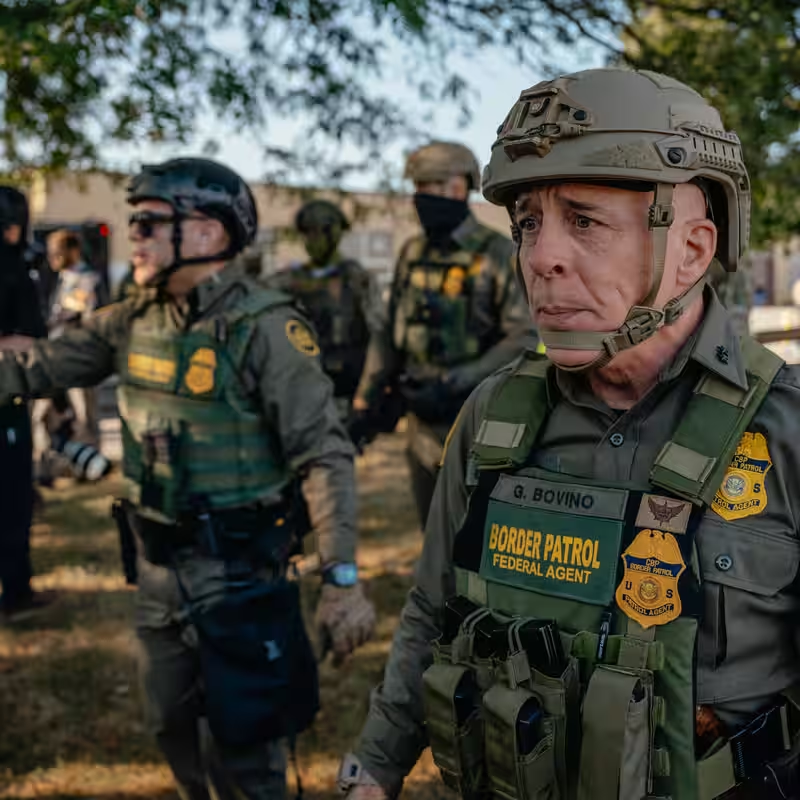Table of Contents
- Border Patrol Beyond the Border
- Legal Authority Explained
- How Trump Is Expanding Its Role
- Controversies and Civil Liberties Concerns
- What This Means for Americans
- Sources
Border Patrol Beyond the Border
When most Americans hear “Border Patrol,” they picture agents in desert outposts or checkpoints near the southern U.S. border. But under the Trump administration, the agency’s presence is being felt far beyond those zones—in cities like Chicago, Atlanta, and even Portland.
As immigration enforcement becomes a centerpiece of domestic policy, the White House is increasingly leaning on U.S. Customs and Border Protection (CBP)—and specifically its Border Patrol arm—to carry out interior enforcement actions once reserved for Immigration and Customs Enforcement (ICE).
Legal Authority Explained
The Border Patrol operates under a unique legal framework that grants it broader powers than many realize:
- 100-mile rule: Federal law allows Border Patrol to operate warrantless checkpoints and conduct stops within 100 miles of any U.S. land or coastal border. That zone covers roughly two-thirds of the U.S. population—including major cities like New York, Detroit, and Seattle.
- “Reasonable suspicion” standard: Agents can briefly detain individuals if they have reasonable suspicion of undocumented status—but critics argue this standard is often applied subjectively.
- No judicial warrant required: Unlike local police, Border Patrol can question people about immigration status without a warrant or probable cause within the 100-mile zone.
How Trump Is Expanding Its Role
Since early 2025, the Trump administration has quietly shifted resources and directives to empower Border Patrol agents to conduct more interior operations. Internal memos show the Department of Homeland Security now encourages joint task forces that embed Border Patrol in urban enforcement sweeps—often targeting workplaces, courthouses, and public transit hubs.
This marks a strategic pivot: instead of waiting at the border, agents are now proactively seeking undocumented immigrants deep inside the country. The move has drawn sharp criticism from civil rights groups, who say it blurs the line between border security and domestic policing.
Controversies and Civil Liberties Concerns
Cases have emerged of U.S. citizens—particularly people of color—being detained for hours simply for refusing to answer questions about their citizenship at interior checkpoints. In one widely reported incident in Vermont, a college student was held for over three hours despite presenting a valid passport.
“The Border Patrol is operating like a national police force with minimal oversight,” said Lee Gelernt, deputy director of the ACLU’s Immigrants’ Rights Project. “That’s not what Congress intended.”
What This Means for Americans
Even if you live hundreds of miles from the border, you may encounter Border Patrol. Know your rights:
- You are not required to answer questions about your citizenship at interior checkpoints.
- You can refuse consent to a vehicle search (though agents may still conduct a limited visual inspection).
- If detained, ask: “Am I free to go?”
As the administration doubles down on immigration enforcement, the Border Patrol’s domestic footprint is likely to grow—raising urgent questions about privacy, racial profiling, and the balance between security and liberty.
Sources
The New York Times: What Powers Does the Border Patrol Have Across the Country?
ACLU: Know Your Rights – Border Patrol Encounters
U.S. Customs and Border Protection – Official Site




